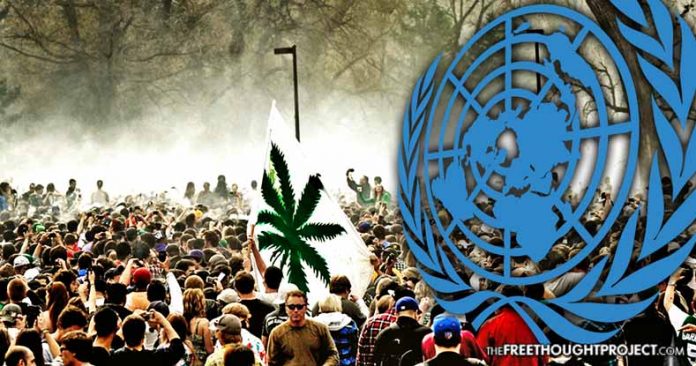American press silence
by Justin Gardner
The Free Thought Project
A little-noticed public statement issued by the United Nations last week contains a dramatic shift in thinking on the issue of “illicit” substance use. After recommitting to the failed idea of prohibition just last year, the UN is now calling for the worldwide decriminalization of drug use and possession.
The statement, put out by the World Health Organization (WHO) as the U.S. is in the midst of a nonsensical debate over health care, calls for “ending discrimination in health care settings.” The WHO calls on states to end discrimination against “marginalized and stigmatized populations” in a variety of ways, and includes a blunt and rather shocking statement on the drug war.
“We, the signatory United Nations entities, call upon all stakeholders to join us in committing to taking targeted, coordinated, time-bound, multisectoral actions in the following areas. Supporting States to put in place guarantees against discrimination in law, policies, and regulations by… Reviewing and repealing punitive laws that have been proven to have negative health outcomes and that counter established public health evidence. These include laws that criminalize or otherwise prohibit…drug use or possession of drugs for personal use.”
This is an admission that the problem of drug abuse is a public health issue, not a criminal justice issue. Locking people in cages for the victimless behavior of ingesting substances arbitrarily deemed illegal by the State does nothing to reduce drug use or supply, as evidenced by the utter failure of the War on Drugs.
Prohibition has also denied people the miraculous healing powers of cannabis. For decades medical research of cannabis was stifled by a drug war borne of racism and political suppression. But research has increased exponentially in recent years as governments around the world take steps to decriminalize this medicinal plant, notably among states in the U.S.With this awakening have come amazing stories of healing through cannabis, such as stopping seizures in children with debilitating epilepsy, treating post-traumatic stress disorder (PTSD) in veterans where all other treatments have failed, and healing a host of other illnesses without the dangerous side-effects of pharmaceutical drugs.
In terms of health care, prohibition is truly discriminatory, and the drug war only degrades public health.
Portugal decriminalized all drugs in 2001 and it has been a resounding success. Drug usage rates, addiction rates, overdose deaths and sexually transmitted diseases have all declined.
The WHO statement is also notable because it contradicts the UN’s reaffirmed support of prohibition during their 2016 “special session on drugs.” The special session was the first to be held in almost two decades, and many were expecting a softened approach from the failed war on drugs.
Despite the pleas of countries like Mexico—suffering from horrendous black market drug violence—to “move beyond prohibition,” a prohibition framework remained in place. In the UN’s 1998 ‘special session on drugs’ the world body agreed to work toward a “drug free world” by 1998. The sheer lunacy of this position is blatantly obvious now more than ever. Despite decades of prohibition and trillions of dollars spent, drugs remain easily accessible.
The WHO statement comes at a time when the U.S. drug war is in a pivotal moment. More and more U.S. states are decriminalizing cannabis at both the medicinal and recreational level, putting themselves at odds with the ongoing federal prohibition of cannabis as a Schedule 1 narcotic. U.S. Attorney General Jeff Sessions, a well-known rabid prohibitionist, is taking steps to ramp up the drug war, calling for increased police measures and prison sentences—even though this approach is proven as a failure.
There is little hope that Sessions and other drug warriors around the world—such as Philippines president Rodrigo Duterte who is now having his police forces murder drug users on the spot (with the explicit blessing of Trump)—will pay any attention to the WHO call for decriminalization. Nevertheless, the WHO statement is an encouraging sign that the tide has turned against prohibition. As the drug war is dismantled piece by piece—in Portugal, U.S. states, Mexico (which recently legalized medical cannabis) and Canada (soon to legalize recreational cannabis)—the wisdom of ending prohibition will become ever more obvious.



